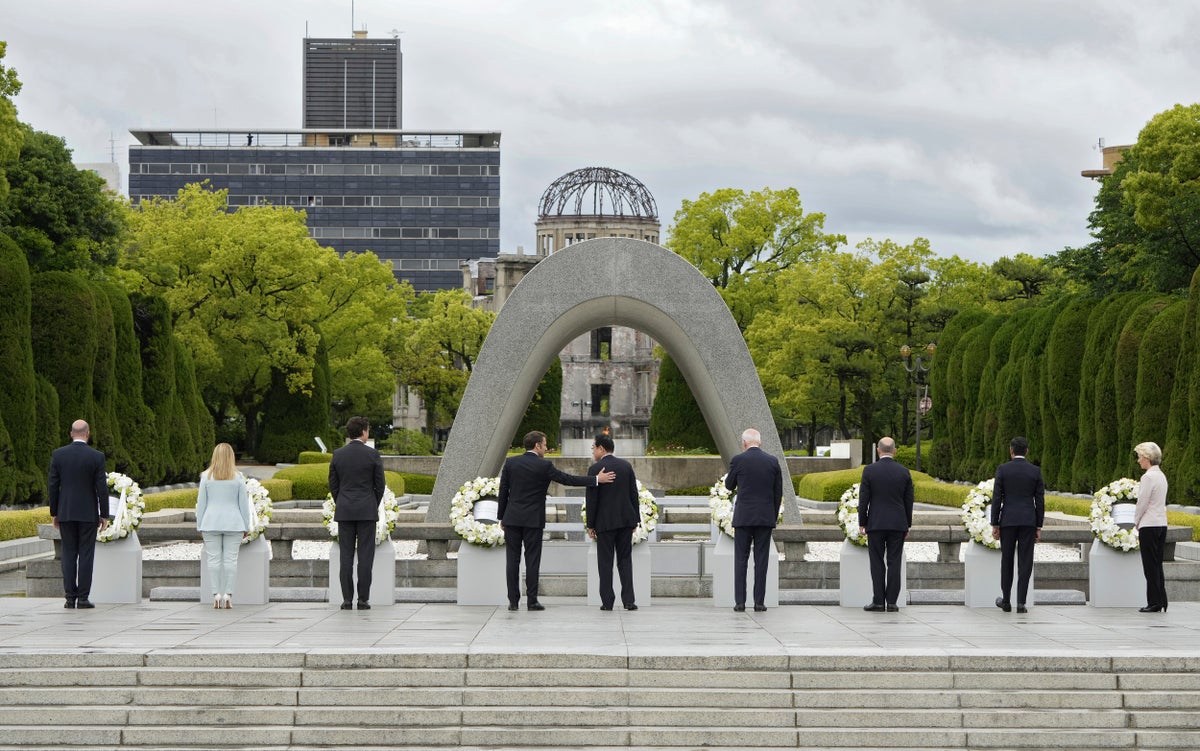
8:15 on the morning of Aug. 6, 1945.
It is a huge motive leaders from the world’s strongest democracies descended on Hiroshima for this weekend’s Group of Seven summit: Half commemoration, half effort to confront the persevering with penalties of the second a U.S. B-29 Superfortress launched what the People named “Little Boy” over the town within the first wartime use of a nuclear bomb.
It additionally presents Japanese Prime Minister Fumio Kishida, the driving pressure behind Hiroshima’s choice for the G7 venue, with a singular dilemma.
On the one hand, he’s eager to advertise the imaginative and prescient of a world with out nuclear weapons that has lengthy been a cornerstone of his political rhetoric. On the opposite, he’s conscious of the widespread home fear over aggression by nuclear-armed neighbors.
Kishida’s troublesome balancing act may very well be clearly seen within the G7’s overwhelming deal with constructing assist for Ukraine’s protection towards nuclear-armed Russia’s invasion, highlighted by Ukrainian President Volodymyr Zelenskyy’s private look in Hiroshima. There was additionally sustained G7 stress on China over its increasing nuclear arsenal, and on North Korea’s pursuit of nuclear-tipped missiles that may goal the U.S. mainland.
However at the same time as he stood shoulder-to-shoulder with Zelenskyy, whose presence on the summit bolsters Kishida politically, the Japanese chief sought to repeatedly infuse the summit together with his concepts a few nuclear-free world.
On each the opening and shutting days of a gathering that included 4 nuclear-armed nations — G7 members France, the U.Ok., the USA, and visiting participant India — Kishida introduced leaders to pay their respects at memorials to the 140,000 folks killed by the bomb. They planted a symbolic cherry tree, spoke with a survivor and provided a silent prayer.
Geography is an enormous motive for Kishida’s consideration to nuclear disarmament. He represents Hiroshima, the place his household is from, in parliament. Though a pro-military conservative, he’s politically linked to a metropolis the place a fast-dwindling variety of aged bomb survivors are a palpable reminder of one of the crucial momentous occasions in human historical past.
As a baby, Kishida heard concerning the horrors of the atomic bombing from his grandmother, who was from Hiroshima. Her tales left “an indelible mark” and impressed his work for a world with out nuclear weapons, stated Noriyuki Shikata, Cupboard secretary for public affairs.
However Japan, a liberal democracy, staunch U.S. ally and the world’s third greatest economic system, can also be positioned in a harmful neighborhood.
Cautious of China and North Korea, Kishida has been steadily pushing for an growth of a army constrained by a pacifist structure primarily written by the People after Japan’s World Struggle II defeat. He depends on the so-called U.S. army umbrella, which incorporates nuclear weapons and the 50,000 U.S. army personnel, and their highly effective, high-tech weaponry, stationed in Japan.
To some critics, Kishida’s disarmament objectives ring hole as he concurrently pushes to double Japan’s protection price range within the subsequent 5 years and strengthen strike capabilities.
Japan additionally refuses to signal the Treaty on the Prohibition of Nuclear Weapons, which took impact in 2021. Kishida says it’s unworkable as a result of it lacks membership by nuclear states. He maintains that Japan must take a sensible strategy to bridging the hole between nuclear and non-nuclear states in a difficult world.
“A path to a world with out nuclear weapons has grow to be much more troublesome,” Kishida stated in April. “However that’s why we have to maintain elevating the flag of our perfect and regain a brand new momentum.”
On Sunday, the summit’s last day, Kishida escorted South Korean President Yoon Suk Yeol to a small memorial honoring Korean victims of the atomic bombing.
That symbolic go to helps reveal the difficult path Kishida follows.
As he paid tribute to victims of the bombing, he was additionally trying to solidify Japan’s safety stance by bettering a relationship with South Korea that has lengthy been shaky due to unresolved disputes linked to the 1910-1945 Japanese colonization of the Korean Peninsula.
Yoon’s workplace described Kishida’s go to to the memorial as a “brave act” and stated that Washington, Seoul and Tokyo agreed “to strengthen deterrence towards North Korea” and enhance protection cooperation, together with sharing real-time info on North Korean missile launches.
U.S. President Joe Biden stated that being in Hiroshima for the G7 was “a strong reminder of the devastating actuality of nuclear conflict” and a reminder of nations’ shared accountability to work for peace. However Biden additionally confused Sunday a willingness to problem Russia by serving to Ukrainians defend themselves.
Kishida’s conferences on the summit with Biden and Yoon are “an event to point out the opposite workforce, the China-Russia-North Korea coalition, solidarity among the many democracies within the area and their resolve to face as much as the more and more threatening autocracies,” stated Sung-Yoon Lee, an East Asia skilled at Tufts College’s Fletcher Faculty of Legislation and Diplomacy.
Kishida, Yoon and Biden’s joint deal with victims of the bombing, Lee stated, “sends an implicit message to China, Russia and North Korea: ‘We’ll always remember.’”
___
Foster Klug is AP’s information director for Japan, the Korean Peninsula, Australia and the South Pacific and has coated Asia since 2005.







:format(webp)/https://www.thestar.com/content/dam/thestar/news/canada/2023/05/21/the-ontario-government-offered-the-star-an-interview-with-its-top-doctor-at-the-last-minute-it-was-cancelled-we-found-out-the-real-reason-why/_1kieran_moore.jpg?resize=75%2C75&ssl=1)